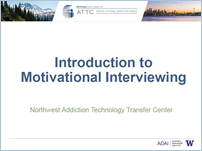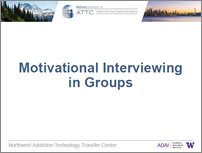
Motivational Interviewing is an evidence-based counseling approach that helps people with mental health and substance use disorders, as well as other chronic conditions (diabetes, asthma, heart disease, e.g.), make positive behavioral changes to support better health.
The developers of MI define it as “a collaborative conversation style for strengthening a person’s own motivation and commitment to change” (Miller & Rollnick, 2012). This guiding style of conversation is used to help the person identify their own reasons and solutions for change.
The approach recognizes that ambivalence about change is normal and can be resolved. MI emphasizes:
MI is well suited for a variety of health settings because it can be applied in briefer patient encounters (Rollnick, Miller, & Butler, 2007), and also works well in combination with other interventions (Arkowitz, Westra, Miller, & Rollnick, 2017). It can be used in group settings (Wagner & Ingersoll, 2012), and its skills are valuable in any situation where resistance to change is encountered (for example, managers and supervisors may find MI skills valuable to use with staff facing change in the workplace).
The NWATTC offers several different trainings on MI:

Learn the foundational concepts and skills of MI, including the underlying spirit of MI, its four processes, and core skills. Develop new skills through the use of role play, individual practice, and interactive group exercises.
Deepen your practice of MI with this training, which focuses on strategic use of the core skills, encouraging and strengthening change talk, and developing your ability to soften sustain talk. Uses video, live demonstration, and interactive group exercises for expanding skill development. (Prerequisite: Introduction to Motivational Interviewing)

Learn how to apply MI methods to your counseling groups. This workshop includes brief instructional presentations, demonstrations, structured learning activities, and group facilitation skill practice, all within an MI framework. (Prerequisite: Participants should have a basic understanding of MI and group facilitation.)
The principles and strategies of MI provide a set of communication and relationship strategies designed to address the common issue of ambivalence toward change, something managers and clinical supervisors may encounter among staff when introducing new practices. This workshop explores the application of MI strategies to working effectively with employees to facilitate internal motivation for change and empower staff using a strength-based approach to leadership.
Intensive technical assistance packages and services are available to promote the successful adoption and implementation of MI. These services are custom-designed and may include follow-up training and booster sessions, individual coaching sessions, and leadership training on MI implementation.
To request training on MI, contact us at [email protected].

